Hearing the Heart Cries of the World:
50 Years of Listening at Seattle’s Crisis Clinic
Written by: Terran Campbell
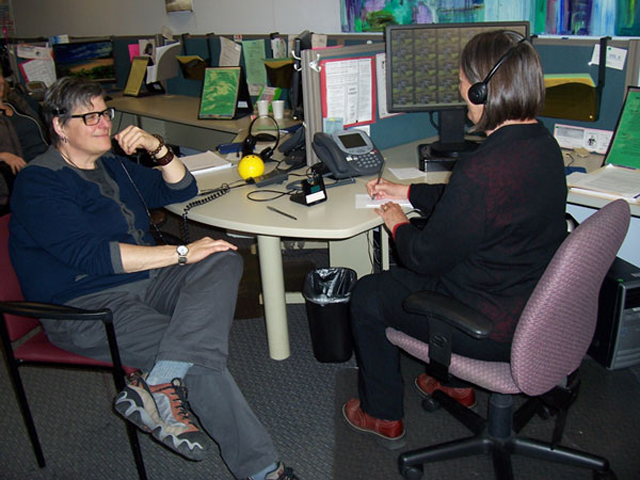
Author Terran Campbell, also a Crisis Line supervisor, shares a light moment with volunteer Bobbie Newall.
Photos by: Terran Campbell, Crisis Clinic, Jenny Scott, Ellen Wilhelm.
A young woman calls whose boyfriend is threatening to shoot himself… Parents of a teen are concerned because their child has not attended school for three weeks… a homeless family is looking for shelter on a rainy Saturday.
Calls like these are answered by volunteers at Crisis Clinic. Founded 50 years ago in Seattle, Crisis Clinic has never closed, day and night providing volunteers and staff for anyone who needs assistance and a listening ear.
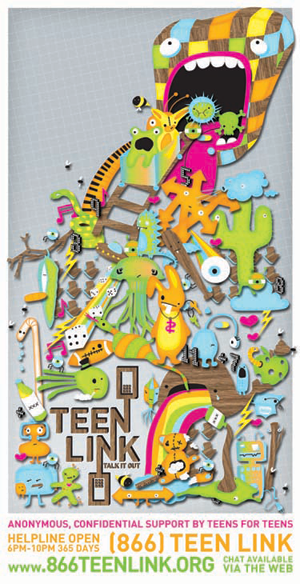
Providing a place for teens to reach out for help, in ways that make sense to them, is an important part of the mission.
I have spent over 22 years of my life working as a Crisis Line supervisor. This is the same amount of time I have had a formal Buddhist practice, and for me the two are closely entwined.
As Buddhists, we often speak about “deep listening” but this takes it to a whole new level.
I think of us as a Kwan Yin listening post.
For many decades Crisis Clinic has supported people primarily by telephone.
The crisis phone room is set up so that volunteers sit together each with a phone and computer, and take calls from people in distress from around King County, which includes Seattle.
Volunteers receive 60 hours of training to take calls monitored and supervised by Mental Health Professionals, who are responsible for all clinical decisions.
The organization is evolving fast in the digital age, and in 2013 became one of the first three in the U.S. offering text support to youths 13 to 25. Crisis Text specialists have answered more than 1 million text messages from youth in crisis since last August.
Buddhist people helping those in need
Many Buddhist practitioners in the region volunteer for the Crisis Clinic, and find it another way to manifest compassion, in addition to the prison work and hospice work many Buddhists do.
To quote from Zen teacher David Loy: “Our practice needs to extend beyond our sitting cushions and dharma practice halls to embrace a broader understanding of what is happening in our world. Like Kwan Yin, we need to hear and respond to its pain.”
Volunteering offers people the opportunity to take a much more active role in the world.
The generosity of volunteers, thousands of them over 50 years, is what has made the Crisis Clinic possible.
The need is great and increasing, as the world becomes a more complex and difficult place for many people to manage.
Anxiety disorders are on the rise and are the most common mental illness in the U.S. Depressive disorders affect millions of adults. The recession has torn apart many people’s lives through unemployment and financial upheaval. The social services safety net continues to shred, due to gridlock in the government.
These are just a few of the factors affecting modern life. Throw in climate change, massive global upheaval, an unknown future, and peoples’ lives continue to unravel at a frantic pace.
This work has challenged me in profound ways. It has taught me many lessons: How the smallest kindness can send out waves, the mystery of empathy and how it reconnects us, the immense resilience of the human spirit.
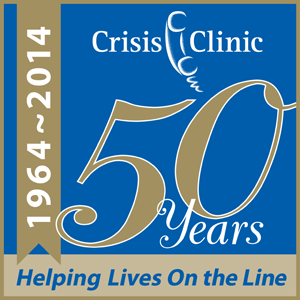
Crisis Clinic has served people needing support at difficult times for 50 years.
I have also learned how good boundaries protect us, and how compassion is not always “nice.” I have learned how despite appearances everyone suffers, and what it means to be with others in their suffering and not have to “fix” it.
This work requires a dance of sorts, what Joseph Campbell called: “One foot in the fight, one foot in the dance.”
The foot in the fight is to do everything possible to assist the person. The foot in the dance is letting go, not controlling or even knowing the outcome. It also requires improvisation, a sense of humor and adventure.
Encounter for me is the heart of practice. My mouth meets the coffee, my eyes meet the dawn, my body meets the chair I am sitting in. My ear meets your voice.
Encounter is the heart of this work, one person telling another their deepest pain. Often families, partners, friends of callers have no idea they are feeling this way, because the callers do not want to burden those to whom they’re close.
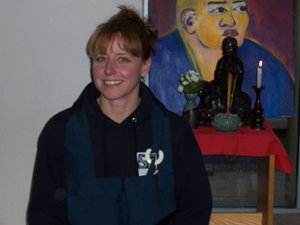
Volunteer Elizabeth Sikes says the work is “a practice of being with what is.”
Three Buddhist volunteers’ experiences
Here are thoughts of three current or former Crisis Clinic volunteers, also Buddhist practitioners, about what they learned from the work and why they consider it important:
Elizabeth Sikes, Ecosangha priest: “One thing you learn is that people define “crisis” in many different ways, but regardless of what I think a crisis is, the only thing that matters is that the person on the other end of the line is experiencing a crisis. The person is suffering enough to make a call and reach out to another human being – to me – when I answer the call. In sitting we practice being with what is, and often this is uncomfortable. But over time you realize more and more what an honor it is.”
Steve Wilhelm, Seattle Insight Meditation Society local dharma leader: “What attracted me was the opportunity was to support people asking for help. I found that my Buddhist practice, some of which involved settling the mind to really listen, was very useful when trying to understand what someone in a difficult moment needed. There was something immediate and authentic about it. People would call sometimes suffering greatly, and in a brief call we often were able to bring them comfort and sometimes help them see new options for their lives.”
Robbie Newell, Mindfulness Community of Puget Sound: “Beginning a shift as a phone room volunteer is truly an experience of being in the present moment. There is no way I can know who will call or what situation has compelled them to call. I can only connect as best I can with my authentic self, and aspire to listen and speak with kindness and appropriate boundaries. This weekly practice has changed my life and offered me so much.”
Most of us come to Buddhist practice because of our own crisis, our own pain.
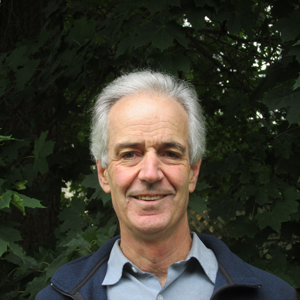
Former volunteer Steve Wilhelm said the listening developed in Buddhist practice was helpful when on the phone.
Sitting in meditation over many years can help us slowly know ourselves and help us not abandon ourselves; to build up stamina and patience with our suffering. And by being with that pain, it somehow changes.
On crisis line calls we help create a container to hold another’s suffering. Beneath the veneer of our lives something is trying to break through. This breaking-through is what I love most about crisis intervention work.
In crisis we are at our most vulnerable. Our usual coping strategies have failed us. It is a unique opportunity for opening. Two strangers encounter each other on the end of a phone line. Buddha meets Buddha.
In our 50 years of operation Crisis Clinic has expanded our services to include 211, The Community Information Line which handles resources for tangible needs; Teen Link, a line for youth struggling with difficult issues; and the Washington Recovery Helpline, a statewide line for adults and teens needing support and resources for mental health, substance abuse and problem gambling.
The Washington Warm Line is a peer-answered support line for people living with mental illness across the state. Crisis Chat provides online emotional support.
As Crisis Clinic celebrates its 50th year, it continues to respond to changing needs just as do Buddhist meditational deities of compassion. Perhaps you’d like to contribute to this work.
To join in the celebration, train to be a volunteer, or for more information, please see the Crisis Clinic website.
